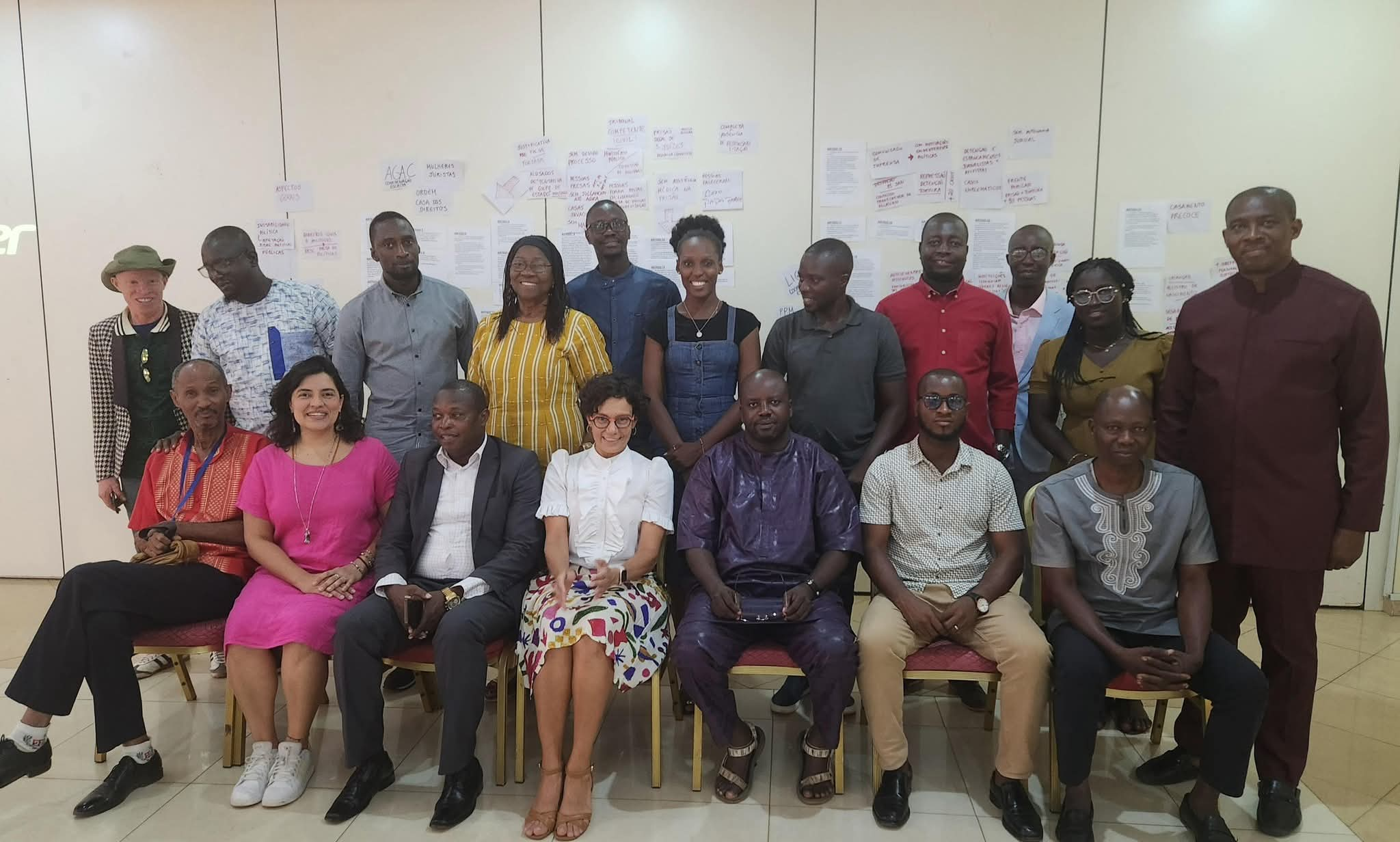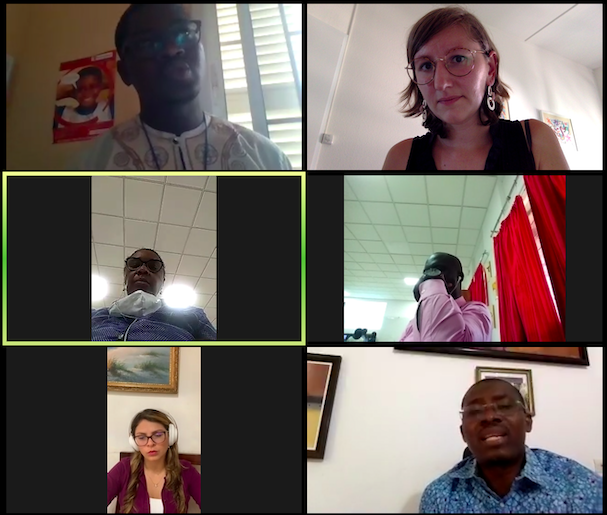Guinea-Bissau: Promised reforms, persistent violations: What remains of the State's commitments?
Published on 28 Jul 2025, 04:03 PM
Between institutional rhetoric and alarming findings, Guinea-Bissau faces harsh criticism from the Human Rights Committee, which condemns impunity, violations of freedoms, and the ineffectiveness of announced reforms.
.jpg) Police officers during a festival in Bissau, Guinea-Bissau,11 February 2018, Author: Xaume Olleros/AFP via Getty Images
Police officers during a festival in Bissau, Guinea-Bissau,11 February 2018, Author: Xaume Olleros/AFP via Getty Images
On June 26 and 27, 2025, the United Nations Human Rights Committee examined Guinea-Bissau's first periodic report on the implementation of the International Covenant on Civil and Political Rights (ICCPR) in Geneva. The Guinea-Bissau delegation, led by Mr. Francisco José Fadul, Minister of Justice, presented in detail the legislative reforms and institutional commitments undertaken by the State since the democratic transition began in 1991. However, behind this legal framework, Committee members lamented a lack of specific answers on the concrete reality of human rights in the country, particularly with regard to torture, justice, and the protection of vulnerable persons.
Even before the dialogue began, concerns had been expressed about the safety of human rights defenders who had collaborated with UN mechanisms. Although local civil society was cautious in its participation, the fear of reprisals was very real. This concern was explicitly raised by the Committee Chair at the beginning of the session, calling on the State party to guarantee the freedom of action and safety of all persons cooperating with the Committee.
From the outset, the issue of torture and inhuman treatment has been a central concern for the Committee. Despite the delegation's assertions that torture is prohibited by law, the experts pointed out that documented cases of violence perpetrated by the security forces continue to be reported, in a climate marked by impunity. The Committee therefore emphasized the need for prevention mechanisms, effective sanctions, and reliable statistical data to measure the true extent of the phenomenon on the ground.
Torture, ill-treatment, and impunity: a key issue
The Committee expressed serious concern about persistent allegations of torture and ill-treatment by security forces, including in sensitive locations such as the Presidential Palace. These practices often target political opponents, peaceful protesters, or human rights defenders.
The delegation acknowledged that serious abuses had occurred in the past, citing in particular a case of rape in detention in 2013, for which disciplinary measures had been taken against those responsible. It also stated that torture was prohibited under national law and that all allegations were investigated and prosecuted, although little data was provided on recent cases.
Freedom of expression and peaceful assembly undermined
When questioned about the growing restrictions on freedom of expression and freedom of assembly, the delegation pointed out that these rights were guaranteed by the Constitution, while specifying that statements considered insulting or defamatory could lead to legal proceedings. The Committee found this position worrying, fearing that it could be used to justify the repression of dissenting voices. The State provided explanations, justifying some of the measures on the grounds of preserving social peace.
The fight against corruption, the need for concrete measures
Although presented as a priority by the delegation, the fight against corruption continues to suffer from a lack of effectiveness. The Committee requested clarification on the number of prosecutions initiated, the concrete results of the national strategies adopted, and the guarantees of independence of the bodies responsible for their implementation. The lack of effective access to public information and the risks of political interference in investigations undermine the credibility of state action in this area.
The delegation highlighted several instruments that have been adopted, including the National Anti-Corruption Strategy, an asset recovery office, and draft laws on transparency and the confiscation of ill-gotten gains. However, no statistics were provided on investigations or prosecutions initiated, and the risks of political interference in proceedings were not addressed.
An independent judiciary, a guarantee of the preservation of rights
The Committee questioned the independence of the judiciary in a context marked by persistent political interference. The suspension of the President of the Supreme Court, the lack of budgetary autonomy of the courts, and the absence of guarantees of appointment based on merit were highlighted as symptoms of a weakened judiciary. The Committee recommended ambitious structural reforms to restore judicial independence, in accordance with Article 14 of the ICCPR.
The delegation indicated that elections had recently been held to appoint the president of the Court and that efforts were underway to strengthen the capacities of judges and improve infrastructure. Nevertheless, guarantees of appointment based on merit and the establishment of a stable financing system for the judiciary have yet to be implemented.
Watch the review session again here (day 1) and here (day 2).
Disclaimer: The transcripts of the dialogue available here, provided by WIPO's Speech-to-Text system, served as the main source for this article. Although all information has been carefully verified, please refer to the audio or UN WebTV for an official version of the dialogue.
Civil society in Geneva to highlight realities on the ground
It should be noted that, thanks to the logistical and technical support provided by the CCPR Centre, five human rights defenders from Guinean civil society were able to participate in the session of the Human Rights Committee in Geneva in June 2025: Edmar Paulo Babilé Nhaga, Silvina da Silva Tavares, Biro Embalo, Gueri Gomis, and Cabi Sanha. Their presence helped to strengthen the voice of non-state actors in the dialogue with the Committee's experts, particularly through bilateral exchanges, preparatory meetings, and informal discussions.
For Silvina da Silva Tavares, this opportunity was much more than a symbolic moment:
"In Geneva, we were able to express the concerns of our communities, without filter, before a Committee that was listening. It was not just a platform, but a space for empowerment. Thanks to the support of the CCPR Centre, we demonstrated that Guinean-Bissau civil society can speak with a clear and structured voice on issues of justice, impunity, and freedoms. "
This direct participation helped to lend credibility to the alternative reports submitted to the Committee and to illustrate, through concrete testimonies, the gap between the legal standards proclaimed by the state and the realities experienced by the population. The return of the defenders to the country will also pave the way for a public presentation of the concluding observations and for national mobilization to ensure their effective follow-up.
Recommendations of the Human Rights Committee
The concluding observations on Guinea-Bissau's first report were published on July 18, 2025. The State party is requested to provide, by July 18, 2028, information on the following recommendations (summarized):
National human rights institution
Given its commitment to the Human Rights 75 initiative, the State party should ensure that the National Human Rights Commission fully complies with the Paris Principles, guarantee its independence in the exercise of its mandate, and provide it with the financial and human resources necessary to effectively fulfill its functions.
Human trafficking, elimination of slavery and servitude, and domestic violence
The State party should strengthen its efforts to prevent, combat, and punish trafficking in persons, particularly children exploited for forced begging, domestic servitude, or sexual exploitation. To this end, it should:
- a) Strengthen the legal and institutional framework by fully implementing the anti-trafficking law, ensuring its compliance with the Covenant and international standards, and adopting an updated and coordinated national action plan;
- b) Ensure prompt and thorough investigations into all cases of trafficking, prosecute perpetrators, and impose proportionate penalties;
- c) Ensure that victims, particularly children, have effective access to protection, assistance (shelters, care, legal aid, rehabilitation) and full reparation, including compensation.
Freedom of assembly and association, and protection of human rights defenders
The State party should guarantee an environment conducive to peaceful assembly and freedom of association, ensuring that any restrictions are legal, necessary, and proportionate. It must protect civic space, allow human rights defenders, journalists, trade unionists, and activists to act without fear, and avoid any interference, stigmatization, or harassment of civil society organizations.
Here, you can find all the recommendations given by the Committee in the Concluding Observations.
The follow-up report of Guinea-Bissau on the implementation of recommendations is due in 2028. The next list of issues will be adopted in 2031, and the next periodic report is due in 2032.
.jpg) Police officers during a festival in Bissau, Guinea-Bissau,11 February 2018, Author: Xaume Olleros/AFP via Getty Images
Police officers during a festival in Bissau, Guinea-Bissau,11 February 2018, Author: Xaume Olleros/AFP via Getty Images

.jpg)


